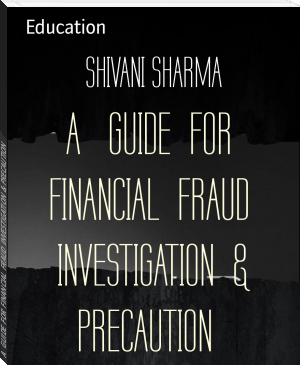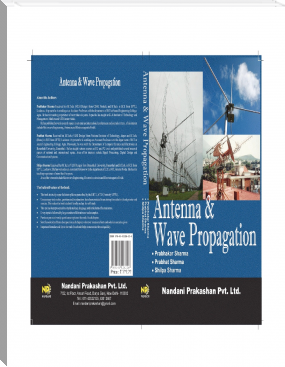A GUIDE FOR FINANCIAL FRAUD INVESTIGATION & PRECAUTION - SHIVANI SHARMA (i love reading books .TXT) 📗

- Author: SHIVANI SHARMA
Book online «A GUIDE FOR FINANCIAL FRAUD INVESTIGATION & PRECAUTION - SHIVANI SHARMA (i love reading books .TXT) 📗». Author SHIVANI SHARMA
Popular scams perpetrated by these criminals include phony mortgage rescue schemes, loan modification schemes, and equity skimming. The frauds frequently are carried out by real estate or mortgage specialists who have an in-depth knowledge of mortgage finance. Mortgage fraud also can be perpetuated by the borrower. Some borrowers may claim to have assets they do not so that they can get a loan they cannot really afford. Mortgage fraud is damaging to lenders because they face a high risk of default if the consumer cannot afford the loan. Criminals also may engage in mortgage loan fraud to steal funds from lenders. Borrowers may also scam lenders by inaccurately stating their income, not occupying the home themselves, or getting a gift for a down payment and repaying it.
The FBI strongly advises homeowners who are in trouble on their mortgages to only work with mortgage professional they have carefully vetted. Seek referrals from professionals in the industry. Also, check licenses and walk away if the person is pressuring you. It also is advised to not engage in a mortgage modification due to an unsolicited relationship.
Lottery Fraud:-Most lottery fraud scams target the elderly. They typically originate with a telephone call or possibly a postcard that is sent from Jamaica. In 2011, the FTC received in excess of 30,000 complaints about lottery fraud. A common fake lottery scam requests that the supposed winner send funds to cover taxes and fees on the prize. Victims who pay the fee are then requested to send more money to claim the prize. It is very rare for the stolen money to get recovered. Also, it is common for the names and contact information for the victims to be put on a ‘suckers list’ that is shared with other fraudsters.The FTC warns consumers that they should never pay anything to collect a lottery prize. You should be very skeptical if you are informed you won a lottery that you never entered. Never share your credit card or bank account details. Never send money, even if the organization sends you a check first. Also, remember that current US law does not allow for international sale or purchase of lottery tickets. So any communication regarding an international lottery is a scam.
Charity Fraud:- A phony charity can use the same techniques to steal money as real charities use to raise money. Before you give a donation, you should be certain of where your money is going. Do not pay attention to high-pressure sales pitches. Never give cash, and always be on guard after a natural disaster. This is when con artists know that people are likely to be generous and sympathetic as they open their wallets. You should obtain the contact information for the charity and examine the organization before you provide funds. The organization also should be an IRS-approved nonprofit organization.There are many examples of fraudulent charities. One of the worst is located in Florida called the Kids Wish Network. Each year, the charity has raised millions of dollars in the names of dying children and their loved ones. It has been reported that the charity spends less than three cents of every dollar helping families and children. Most of the rest is used to enrich the owners of the charity. On average, the worst charities in America devote less than 4% of their donations to their causes.
Ponzi Schemes. Named for Charles Ponzi, a con artist who operated in the U.S. and Canada in the 1920s, Ponzi schemes vary in approach and structure. In general, these schemes promise you high financial returns on a nonexistent investment. The perpetrator of the Ponzi scheme takes a portion of your investment to pay other investors while pocketing the majority of the money for him or herself. In 2009, financier Bernie Madoff was sentenced to 150 years in prison for perpetrating the largest Ponzi scheme in U.S. history. Madoff took $65 billion from thousands of investors, promising consistently large returns. Rather than investing the money as he was supposed to, Madoff used new investors’ money to appease other investors with token payouts. Madoff’s Ponzi scheme fell apart when investors demanded $7 billion in returns that Madoff did not have the money to pay.
Advance Fee Schemes. In this type of fraud, you are asked to pay an upfront fee for a product or service — sometimes called a membership fee, administrative fee or tax. One possible scenario is that you are invited to participate in an “exclusive special offer” to receive something of greater value than the amount you pay, but you receive nothing or something of little value in return. Many work-from-home offers are, in fact, advance fee schemes. You are enlisted to sell a product or line of products such as cleaning supplies, kitchen gear or weight loss or personal care products, but before you can begin selling you are required to pay a start-up fee for initial inventory and training materials. However when the materials arrive they are either worthless or very hard to sell, and your money is gone.
Payroll Fraud:- Did you know that payroll fraud happens in 27% of all US businesses? It occurs twice as often in small businesses with under 100 employees than big ones. It is important for business owners to have a good understanding of their payroll system. Enforce accountability with bookkeepers in monthly payroll reports. Payroll complexities increase as a company gets bigger, so it is vital that owners constantly scrutinize their books. Your bookkeeper should be able to clearly explain any discrepancies. If not, fraud is possible. At the very least, you should consider getting another bookkeeper. Workers’ Compensation Fraud:- Workers’ compensation fraud is another type of small business fraud you could come across if you have employees. As a business owner, most states require that you purchase workers’ compensation. Workers’ compensation insurance pays your employees if they become injured or ill at work. There are different ways workers’ compensation fraud can occur, so you need to be vigilant. Employees might get injured outside of work and say they got the injury at your business. Or, employees could make up an illness or injury.How do you protect your business from workers’ compensation fraud? You need to document everything, keep accurate records, and look out for signs of fake injuries.
COUNTERFEITING:-Counterfeiting is a criminal offense that involves fraudulently manufacturing and distributing an item of lesser value than the genuine product, usually for the purpose of monetary gain. Counterfeiting is commonly seen in the form of counterfeiting money, including currency and coins, but also involves the fraudulent production of copies of valuable digital media, such as CDs and DVDs, as well as designer clothing, jewelry, and accessories. The production, distribution, and sale of counterfeit items not only defrauds those buying the items but also steals profits from the owners and distributors of the genuine articles. TAX EVASION:-Tax evasion in a crime in which an individual or entity intentionally underpays, or avoids paying, taxes. Every year, each citizen who has income and/or assets is required to file a tax return. Each year many people misrepresent how much money they earned, and claim deductions to which they are not entitled in an effort to keep their money away from the IRS. The U. S. Government estimates that more than $300 billion is lost each year due to tax evasion. To explore this concept, consider the following tax evasion definition. Embezzlement:- it is a crime that takes place when a person purposely withholds or uses assets and monies for a purpose other than for what it is intended. Also referred to as “financial fraud” or “larceny,” embezzlement is typically committed by an employee who is in charge of an agency or company’s finances or a person who has responsibilities pertaining to the assets. Embezzlement is considered a white-collar crime and can affect both small and large businesses. Forgery:- It is a criminal act that takes place when a person falsifies something with the intent to deceive another person or entity. There are many kinds of forgery, but all are considered crimes in the United States. Forgery has a long history, but it became more common in the 20th century as technology has made it easier for criminals to commit the act. Some cases




Comments (0)